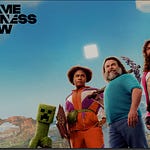Listen now on Apple, Spotify or YouTube
In This Edition
- Game media producing fewer articles
- The scale of journalist layoffs revealed
- Jackbox Games vs Netflix
- Bethesda delivers another shadow drop
It’s the one-month anniversary of The Game Business, and it’s been quite the month. And considering my love of data, I’ve broken it down in number form.
We have had:
11 Shows
2 Bonus Shows
17 Newsletters
235,000 readers/listeners/viewers
Over 30,000 video views
12,500 podcast listens
6,000 subscribers
A genuine heartfelt thank you to everyone who has signed-up, shared my articles, covered the stories, and especially to all my interview subjects and guest hosts. You’ve made this month a complete joy.
But enough of all that. To month two! And this week we’re tackling the games media. You can check out the key stories below, and delve deeper into them via the Show above, where I’m joined by two guest hosts: IGN, Future and ReedPop media veterans Jon Hicks and Kat Bailey.
Enjoy!
Specialist game websites produced 13% fewer articles in Q1 this year
The Top 135 video game websites published over 635,000 articles during Q1 this year, Press Engine data reveals.
That’s a drop of over 13%, or more than 100,000 articles, compared with the same period in 2024.
That number covers reviews, news, guides, features and code pages, and includes websites from around the world. A lot of the biggest drops were at guides-based publications, but there were also big declines amongst the major media outlets, including IGN, GameSpot, Famitsu and Eurogamer.
(Press Engine is a PR tool that developers and publishers use to send game codes and press releases to a database of journalists and content creators.)
The reason for the decline is no big surprise. According to Press Engine, it has seen 2,902 ‘press contacts’ disappear from its database over the past two years. Those press contacts will include amateur, part-time and freelance journalists, but it ultimately highlights a significant drop in people writing about video games, with redundancies having hit almost all major game media publications.
There are other factors influencing the drop in video game articles, including a continued shift towards covering the biggest titles, a decision driven by recent changes to the Google search engine.
“Given the number of journalists leaving the industry, a drop in articles is to be expected, but the shift has been dramatic since Google’s Helpful Content Update,” said Press Engine founder Gareth Williams.
“Independent publishers would describe it as anything but helpful, with some websites closing entirely. It’s caused SEO strategies to be revised, and the rise of subscription-based support, even for some of the larger publications. Without the audience being ushered to valuable content, publishers are not going to invest in content that doesn’t meet commercial goals.”
“It’s never been harder for indie or any game to secure coverage.”
The issue from an industry perspective is that, as a result of these changes, the games media is scaling back coverage of games outside of the bigger AAA productions. And this only exacerbates the discoverability challenges facing smaller studios and publishers.
“This drop in articles marries with reducing and converging audiences within specialist media, which in turn has led to frantic competition for high-ranking performative content – the biggest games – with little room for AA or indie titles,” Williams added. “An unintended outcome is that it’s never been harder for indie or any game to secure coverage.”
You can hear more from editorial experts Jon Hicks and Kat Bailey on the subject in today’s The Game Business Show.
Jackbox Games: Netflix is wise to move into party games
At GDC this year, Jackbox Games – the publisher and developer of casual party games - announced it was launching a streaming and subscription service via a partnership with Amazon’s GameLift service.
Also at GDC this year, the streaming and subscription platform Netflix announced it would move into developing casual party games for its audience of around 700 million users.
I caught up with Jackbox CEO Mike Bilder this week to learn more about its new service. But I had to ask, what does he make of the firm’s new potential rival?
“I don’t think it’s necessarily going to be one dominant player,” he told The Game Business. “In the past when you look at cloud gaming, you talk about Stadia, you talk about really big initiatives. The people approaching it now are a little bit more measured about it.
“I think Netflix is wise. One of the flaws of Stadia in the past is that it was meant to be this console killer, it was a replacement for your AAA PC rig. It was AAA 4K gaming everywhere whenever you want. What was maybe misunderstood is a lot of people have invested years of their lives into those platforms, and they have entitlements and achievements and friends lists and a group they play with whenever they get online. You may be able to play that AAA game in the cloud, but people want to play it on PS5, because that’s where their friends are, it’s where all their blood, sweat and tears have gone.
“With our kind-of games, that doesn’t matter. When you talk about a cloud gaming service, and you need to Bluetooth connect your generic controller to a television… that adds friction. We’ve learned throughout the course of building our infrastructure and platform that eliminating friction is key to getting people into the game. The moment everybody has to get on the same Wi-Fi, or has to pair a device to this thing, you introduce friction, you’re going to lose people and the interest in playing that game is going to go away pretty quickly. The whole basis of Jackbox.tv being a website, it doesn’t matter what device you’re on, what network you’re attached to, cellular, wi-fi… it’s all with intent because we want to eliminate the friction of play.
“But again, our games serve themselves well for that streaming 10ft experience. My guess is Netflix has identified the same thing, which is why they’re chasing the category of party games.”
“The real competition for us is the Board game or card game you might play at a party, it’s not Call of Duty.”
Bilder hopes to see Jackbox titles appear on Smart TVs and set-top boxes that don’t currently support games. It’s all in the name of reaching customers who are not native games.
“The real competition for us is the board game or the card game you might play at a party, it’s not Call of Duty.”
Bilder told me that if the Jackbox subscription service proves popular, it may start releasing its games individually over time, rather than waiting to bundle them all together in their regular Party Packs. He even discussed the prospect of signing games from third-party developers to include in the service. But he acknowledges there are challenges to overcome before getting to that point.
“I don’t expect overnight this will be some raving success,” he said. “There is still an economic model that needs to be proven out. We still need to figure out in free tiers what kind-of ad units are going to be available. But we’ve been building this for a little while, so we have got a lot of educated guesses on this, and we see a pathway to success. In the near term, I see this existing alongside our existing model, I don’t think it will replace it or cannibalise it. Over time that might shift.”
Meanwhile…
Apple has been fined €500m ($568m) from the European Union for violations of the Digital Markets Act. The firm was fined for not allowing app developers to promote or inform users of alternative storefronts or offers, which means users are instead directed to spend on the App Store (where Apple takes a 30% cut). Apple has accused the European Commission of unfairly targeting the firm, and says the decision is bad for privacy and security. Epic Games, which has been fighting Apple over the issue, celebrated the decision: "Apple is breaking the law by imposing illegal fees, scare screens and restrictions on purchases made outside the App Store,” it said in a statement.
Our good friends at GamesBeat have spun out as an independent media outlet, with the ever-present Dean Takahashi continuing his excellent work as Editorial Director. The new independent outfit is led by CEO Gina Joseph.
Elder Scrolls IV: Oblivion was surprise revealed and released this week, marking Bethesda’s latest ‘shadow drop’ after Hi-Fi Rush in 2023. We discussed the game’s release on this week’s Show, including its unusual release timing – just two weeks ahead of Bethesda’s big budget Doom: The Dark Ages game, and in the same week as another major Xbox Game Pass release: Clair Obscur: Expedition 33.
IO Interactive co-founder and former Square Enix Chief Creative Officer Janos Flösser has revealed his new indie studio: Wombo Games. Based in Copenhagen, the team is building a new RPG called Raiders of Blackveil. The new outfit boasts a flat team structure and includes talent from franchises such as Tomb Raider, Deus Ex, Just Cause and Hitman.
A new not-for-profit organisation looking to decarbonise the games industry has been formed called the Sustainable Games Alliance. The new initiative has been backed by Unity founder David Helgason and Remedy co-founder Petri Järvilehto. The group is hosting an online discussion on April 29 with Unity and Microsoft called: "Improving energy efficiency without compromising the player experience".
Hoby Darling is now President at Riot Games, which is a role that had been held by CEO Dylan Jadeja. Darling has previously held senior positions at Logitech, Skullcandy/Astro Gaming, Nike and Volcom.
Nintendo says it will fail to meet demand for Nintendo Switch 2 in Japan, after seeing more than 2.2 million people apply for the lottery on the My Nintendo Store to receive pre-order access. The console launches June 5.
The Xbox cloud gaming app is now available on the latest LG Smart TVs, which means consumers can stream games directly to the TV without the need for a console. Users will still need the TV, an Xbox Game Pass Ultimate subscription and a Bluetooth controller (PlayStation controllers also work).
Finally, the US tariff saga rumbles on. This week, Nintendo has raised the price of some accessories, while Anebernic, which makes retro handhelds, has suspended shipments to the US. And both are due to the tariffs imposed on goods coming from China. One manufacturer of video game figurines told The Game Business this week that they will likely need to close down if the tariffs on China are not lifted or reduced.
That’s it from us this week. See you on Tuesday where we’ll be speaking to Remedy’s Sam Lake.















Share this post